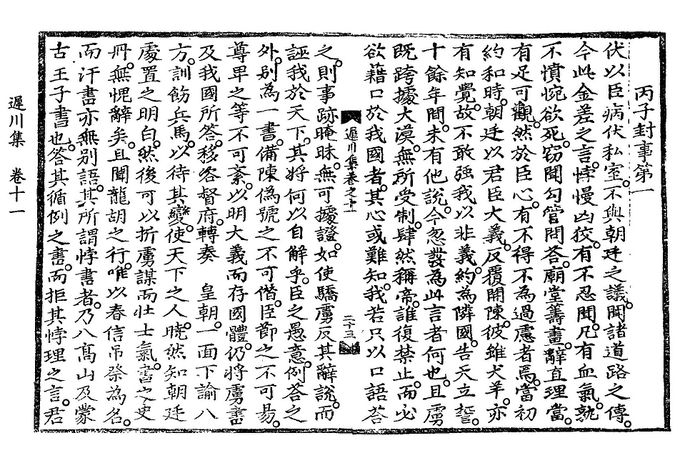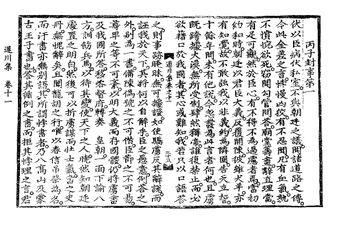"(Translation) 崔鳴吉 丙子封事第一"의 두 판 사이의 차이
| 110번째 줄: | 110번째 줄: | ||
*Discussion Questions: | *Discussion Questions: | ||
| + | Describe the state of Sino-Korean relations during the time of this memorial and in the years following. | ||
| + | |||
| + | |||
| + | Why were certain groups of people (such as the Khitan and Mongols etc.) viewed and written about in a pejorative manner? | ||
| + | |||
| + | |||
| + | Were memorials an effective method through which to influence political decisions? Give examples to justify your answer. | ||
==='''Student 7 : Russell Guilbault'''=== | ==='''Student 7 : Russell Guilbault'''=== | ||
2019년 7월 8일 (월) 15:31 판
| Primary Source | ||
|---|---|---|
 |
Title | |
| English | ||
| Chinese | 丙子封事第一 | |
| Korean(RR) | 병자봉사제일(Byeongjabongsajeil) | |
| Text Details | ||
| Genre | Literati Writings | |
| Type | 箚 | |
| Author(s) | 崔鳴吉 | |
| Year | ||
| Source | Korean Classics and Literati's Collection of Writings (한국고전종합DB) | |
| Key Concepts | ||
| Translation Info | ||
| Translator(s) | Participants of 2019 JSG Summer Hanmun Workshop (Advanced Translation Group) | |
| Editor(s) | ||
| Year | 2019 | |
목차
Introduction
Original Script
| Classical Chinese | English |
|---|---|
|
伏以臣病伏私室。不與朝廷之議。聞諸道路之傳。今此金差之言。悖慢凶狡。有不忍聞。凡有血氣。孰不憤惋欲死。竊聞句管問答。廟堂籌畫。辭直理當。有足可觀。然於臣心。有不得不爲過慮者焉。當初約和時。朝廷以君臣大義。反覆開陳。彼雖犬羊。亦有知覺。故不敢強我以非義。約爲隣國。告天立誓。十餘年間。未有他說。今忽發爲此言者何也。且虜旣跨據大漠。無所受制。肆然稱帝。誰復禁止。而必欲藉口於我國者。其心或難知。 我若只以口語答之。則事跡晻昧。無可據證。如使驕虜反其辭說。而誣我於天下。其將何以自解乎。臣之愚意。例答之外。別爲一書。備陳僞號之不可僭。臣節之不可易。尊卑之等不可紊。以明大義而存國體。仍將虜書及我國所答。移咨督府。轉奏皇朝。一面下諭八方。訓飭兵馬。以待其變。使天下之人。曉然知朝廷處置之明白。然後可以折虜謀而壯士氣。書之史冊。無愧辭矣。且聞龍胡之行。唯以春信弔祭爲名。而汗書亦無別語。其所謂悖書者。乃八高山及蒙古王子書也。 答其循例之書。而拒其悖理之言。君臣之義。隣國之道。得以兩全。於計爲宜。況今山陵未畢。守備未完。權宜緩禍之策。亦何可全然不思。金差不妨招見。所不可見者西㺚耳。西㺚不必薄待。所當嚴斥者悖書耳。 臣竊觀今日虜情。特有早晩。等是被兵。但不可矇矓處置。以致見賣。過於落莫。以促其兵耳。城門閉言路開。雖有悔端。亦不濟事。今日之勢可謂急矣。而幸未至於目前被兵。伏願殿下。益加憤發。先立大志。如頃日諫臣筵臣之言。多所採納。收敍言事之臣。勇革病民之政。振拔人才。激勵將士。以慰臣民之望。則人心旣悅。國勢自固。雖有外患。亦不至大段顚沛矣。臣之賤疾。一向沈綿。精神昏憒。全不省外事。而竊不任區區憂國之誠。冒陳所懷。唯明主裁之。取進止。 |
(translation) |
Discussion Questions
Further Readings
References
丙子封事[第二] http://db.itkc.or.kr/dir/item?itemId=MO#/dir/node?dataId=ITKC_MO_0328A_0110_010_0130
丙子封事[第三] http://db.itkc.or.kr/dir/item?itemId=MO#/dir/node?dataId=ITKC_MO_0328A_0110_010_0140
Translation
(sample) : Jaeyoon Song
- Discussion Questions:
Student 1 : (Write your name)
- Discussion Questions:
'Student 2 : Samuel Sai Hay Chan 陳世熙 진세희"
- Discussion Questions: What is the historical context in which this memorial was written? What did the memorial tell us about Choson-Qing relation in the 1630s? Why was the Choson-Qing relation like this? Previous scholars have attributed Choson's cultural prejudice against the Jurchen-cum-Manchurians as a main cause of an antagonistic relation between Choson and Qing. What about the causes in the political-economy?
Student 3 : Younès M'Ghari
- Discussion Questions:
- Is the concept of "closing the gates and opening the channels of expression" something typically Korean during the Yi dynasty? If not, was is also existing in China and Koryô?
- Did the Chosôn court really think that it was the most "civilized" among the "barbarians" around China?
- Who compiled Choe Myônggil's memorial, when and for what purpose?
Student 4 : King Kwong Wong
- Discussion Questions:
Student 5 : 신동조
- Discussion Questions:
What would the hawks say about 최명길's memorials? What would be their strategies to defend their country?
Student 6 : Stacey Lui
- Discussion Questions:
Describe the state of Sino-Korean relations during the time of this memorial and in the years following.
Why were certain groups of people (such as the Khitan and Mongols etc.) viewed and written about in a pejorative manner?
Were memorials an effective method through which to influence political decisions? Give examples to justify your answer.
Student 7 : Russell Guilbault
- Discussion Questions:
- How is Choe Myeong-gil situated within the political context of the Joseon court at this time? Who, if anyone, takes the opposing view? Do they use the same strategies for convincing the king? That is, how similar do the opposing memorials look to Choe's?
Student 8 : Q
- Discussion Questions:
Who was Ch'oe Myŏngkil (Choe Myeonggil)? Considering the situation of the Chosŏn (Joseon) in the 17th century, what were the factors that influenced his writing?
Student 10 : Yeonjae Ra
- Discussion Questions: Few contents of this memorial is also written in choson wangjo sillok(朝鮮王朝實錄), however his appeal was not responded by the king(仁祖). That’s why? But why this memorial was written in official writings?
choson wangjo sillok [1]
